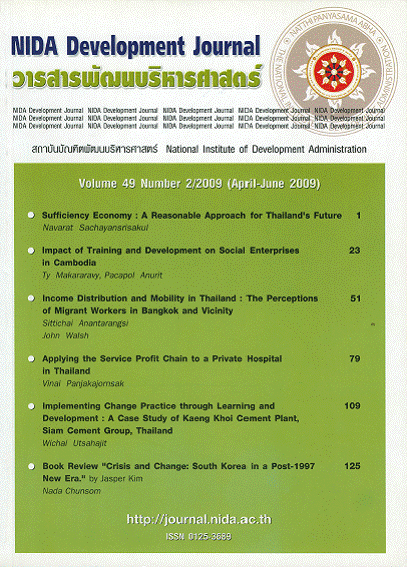Income Distribution and Mobility in Thailand: The Perceptions of Migrant Workers in Bangkok and Vicinity
Keywords:
Income distribution, Mobility, Migrant Workers, Investment, การกระจายรายได้, การเคลื่อนย้าย, แรงงานอพยพ, การลงทุนAbstract
The issue of labour migration in Thailand has been an important one for many years. People move to work for a variety of reasons and provide a high level of remittances for people who remain behind. Migrant flows are generally two-way, insofar as people often move on a temporary basis and are prepared to return home if circumstances are right. Labour migration helps solve problems of mismatch of supply and demand in a dynamic labour market and economy but also has many social consequences as well. Family break ups, risk-taking behaviour and pressure on public services are phenomena commonly associated with migration, while brain drain, discrimination and intensified inequality are related issues which need to be addressed by government. Thailand’s economy is changing as it has matured from a low cost factory economy to a midway point towards eventually becoming an advanced economy. However, the current position is one which requires careful government to assure that the economy progresses in the desired way. To achieve this requires understanding of the motivations and aspirations of migrant labour in Thailand and appropriate evidence on which to base policy to encourage the inculcation of skills in the labour market and to provide incentives to encourage social mobility as well as geographical mobility. This research study draws upon a quantitative study of 394 migrant workers in Bangkok and its vicinity with a view to recording baseline information about why people have moved, under what circumstances they will move again and what issues surround the labour migration observed
ประเด็นความสำคัญของแรงงานอพยพในประเทศไทยนั้นเป็นประเด็นที่เรื้อรั้งมานานหลายปี โดยที่แรงงานอพยพนั้นอาจมีหลากหลายเหตุผลอีกทั้งแรงงานอพยพเหล่านี้ก็ได้ส่งเงินกลับไปช่วยเหลือสมาชิกครอบครัวที่บ้านเกิด โดยมากแรงงานอพยพนั้นจะทำการอพยพเป็นการชั่วคราวและจะกลับบ้านเกิดถ้าหากมีความพร้อมหรือเมื่อสถานการณ์นั้นอยู่ในความเหมาะสมแรงงานอพยพนั้นอันที่จริงมีช่วยบรรเทาปัญหาความไม่สอดคล้องของอุปสงค์และอุปทานด้านแรงงานในสภาวะที่ไม่เคยหยุดนิ่งของตลาดแรงงานและระบบเศรษฐกิจและส่งผลกระทบทางสังคมในเวลาต่อมา ดังเช่น ความแตกแยกของครอบครัว, ความเสื่ยงในด้านความประพฤติของแรงงานอพยพอันเนื่องมาจากแรงกดดันของสภาพที่ผู้คนแออัดในสังคมและบริการสถารณะที่ไม่เพื่องพอต่อแรงงานอพยพเหล่านี้. ซึ่งสิ่งเหล่านี้ล้วนแต่มีความเกี่ยวพันในการย้ายถิ่นของแรงงาน, ขณะที่สมองไหล, การแบ่งแยกและการความไม่เท่าเทียมกันนั้นเป็นประเด็นที่รัฐบาลนั้นไม่สามารถที่จะละเลยหรือมองข้ามได้
เนื่องจากขณะที่เศรษฐกิจของประเทศไทยนั้นอยู่ระหว่างการเปลี่ยนแปลงจากการผลิตด้วยต้นทุนที่ต่ำไปสู่เศรษฐกิจที่ก้าวหน้านั้นรัฐบาลจำเป็นที่จะต้องดำเนินการอย่างระมัดระวังเพื่อให้แน่ใจว่าเศรษฐกิจนั้นจะดำเนินไปในทิศทางที่คาดหวัง. โดยมีความจำเป็นที่จะต้องเข้าใจความปราถนาและแรงจูงใจของแรงงานอพยพในประเทศไทยและใช้ข้อมูลที่เหมาะสมเป็นพื้นฐานในการกำหนดนโยบายเพื่อสนับสนุนแรงงานมีฝีมือที่มีอยู่ในตลาดแรงงานจำนวนมากรวมถึงจัดเตรียมสิ่งกระตุ้นในการสนับสนุนการเคลื่อนย้ายทางสังคมดังเช่นการเคลื่อนย้ายทางพื้นที่. งานวิจัยชิ้นนี้ได้ใช้วิธีการศึกษาเชิงปริมาณจากแรงงานอพยพจำนวน 399 คนที่อยู่ในกรุงเทพฯ และ ปริมณฑล พร้อมด้วยบันทึกบทสัมภาษณ์ถึงสาเหตุในการตัดสินใจอพยพหรือเคลื่อนย้ายถิ่นฐานในสถานะการณ์และประเด็นต่างๆ.





